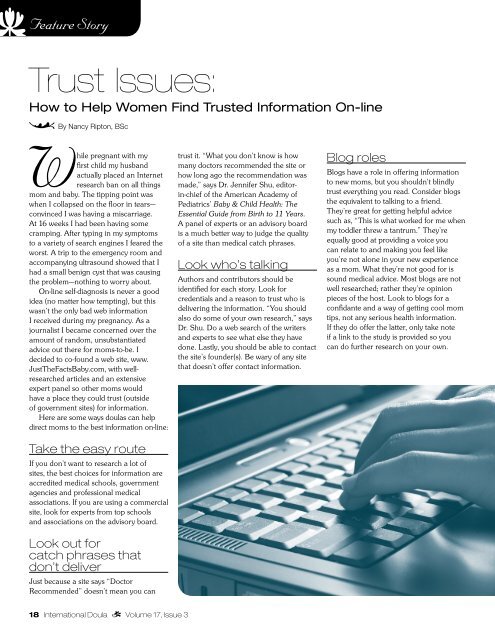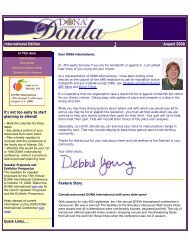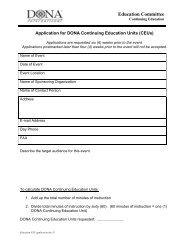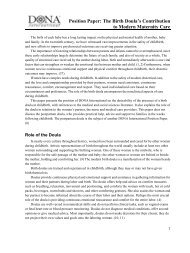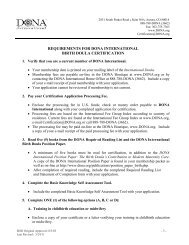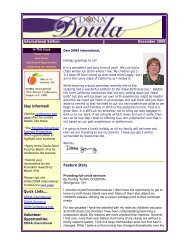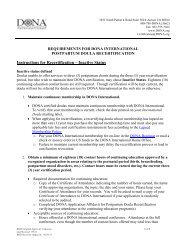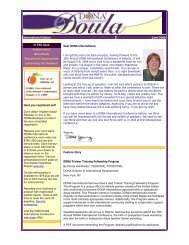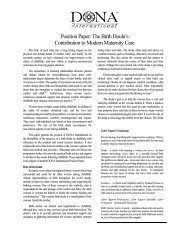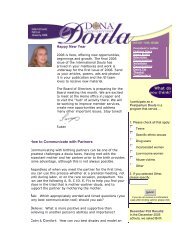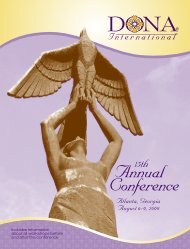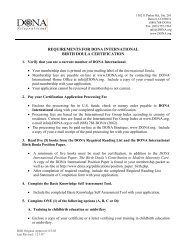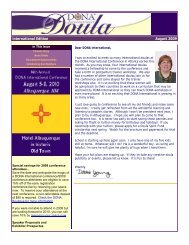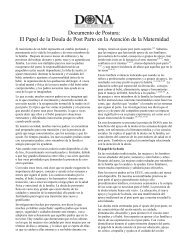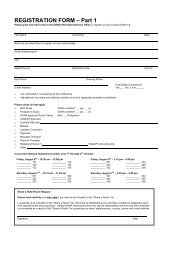The Power of Milk - DONA International
The Power of Milk - DONA International
The Power of Milk - DONA International
You also want an ePaper? Increase the reach of your titles
YUMPU automatically turns print PDFs into web optimized ePapers that Google loves.
Feature StoryTrust Issues:How to Help Women Find Trusted Information On-lineBy Nancy Ripton, BScWhile pregnant with myfirst child my husbandactually placed an Internetresearch ban on all thingsmom and baby. <strong>The</strong> tipping point waswhen I collapsed on the floor in tears—convinced I was having a miscarriage.At 16 weeks I had been having somecramping. After typing in my symptomsto a variety <strong>of</strong> search engines I feared theworst. A trip to the emergency room andaccompanying ultrasound showed that Ihad a small benign cyst that was causingthe problem—nothing to worry about.On-line self-diagnosis is never a goodidea (no matter how tempting), but thiswasn’t the only bad web informationI received during my pregnancy. As ajournalist I became concerned over theamount <strong>of</strong> random, unsubstantiatedadvice out there for moms-to-be. Idecided to co-found a web site, www.Just<strong>The</strong>FactsBaby.com, with wellresearchedarticles and an extensiveexpert panel so other moms wouldhave a place they could trust (outside<strong>of</strong> government sites) for information.Here are some ways doulas can helpdirect moms to the best information on-line:Take the easy routeIf you don’t want to research a lot <strong>of</strong>sites, the best choices for information areaccredited medical schools, governmentagencies and pr<strong>of</strong>essional medicalassociations. If you are using a commercialsite, look for experts from top schoolsand associations on the advisory board.Look out forcatch phrases thatdon’t deliverJust because a site says “DoctorRecommended” doesn’t mean you cantrust it. “What you don’t know is howmany doctors recommended the site orhow long ago the recommendation wasmade,” says Dr. Jennifer Shu, editorin-chief<strong>of</strong> the American Academy <strong>of</strong>Pediatrics’ Baby & Child Health: <strong>The</strong>Essential Guide from Birth to 11 Years.A panel <strong>of</strong> experts or an advisory boardis a much better way to judge the quality<strong>of</strong> a site than medical catch phrases.Look who’s talkingAuthors and contributors should beidentified for each story. Look forcredentials and a reason to trust who isdelivering the information. “You shouldalso do some <strong>of</strong> your own research,” saysDr. Shu. Do a web search <strong>of</strong> the writersand experts to see what else they havedone. Lastly, you should be able to contactthe site’s founder(s). Be wary <strong>of</strong> any sitethat doesn’t <strong>of</strong>fer contact information.Blog rolesBlogs have a role in <strong>of</strong>fering informationto new moms, but you shouldn’t blindlytrust everything you read. Consider blogsthe equivalent to talking to a friend.<strong>The</strong>y’re great for getting helpful advicesuch as, “This is what worked for me whenmy toddler threw a tantrum.” <strong>The</strong>y’reequally good at providing a voice youcan relate to and making you feel likeyou’re not alone in your new experienceas a mom. What they’re not good for issound medical advice. Most blogs are notwell researched; rather they’re opinionpieces <strong>of</strong> the host. Look to blogs for aconfidante and a way <strong>of</strong> getting cool momtips, not any serious health information.If they do <strong>of</strong>fer the latter, only take noteif a link to the study is provided so youcan do further research on your own.18 <strong>International</strong> Doula Volume 17, Issue 3


